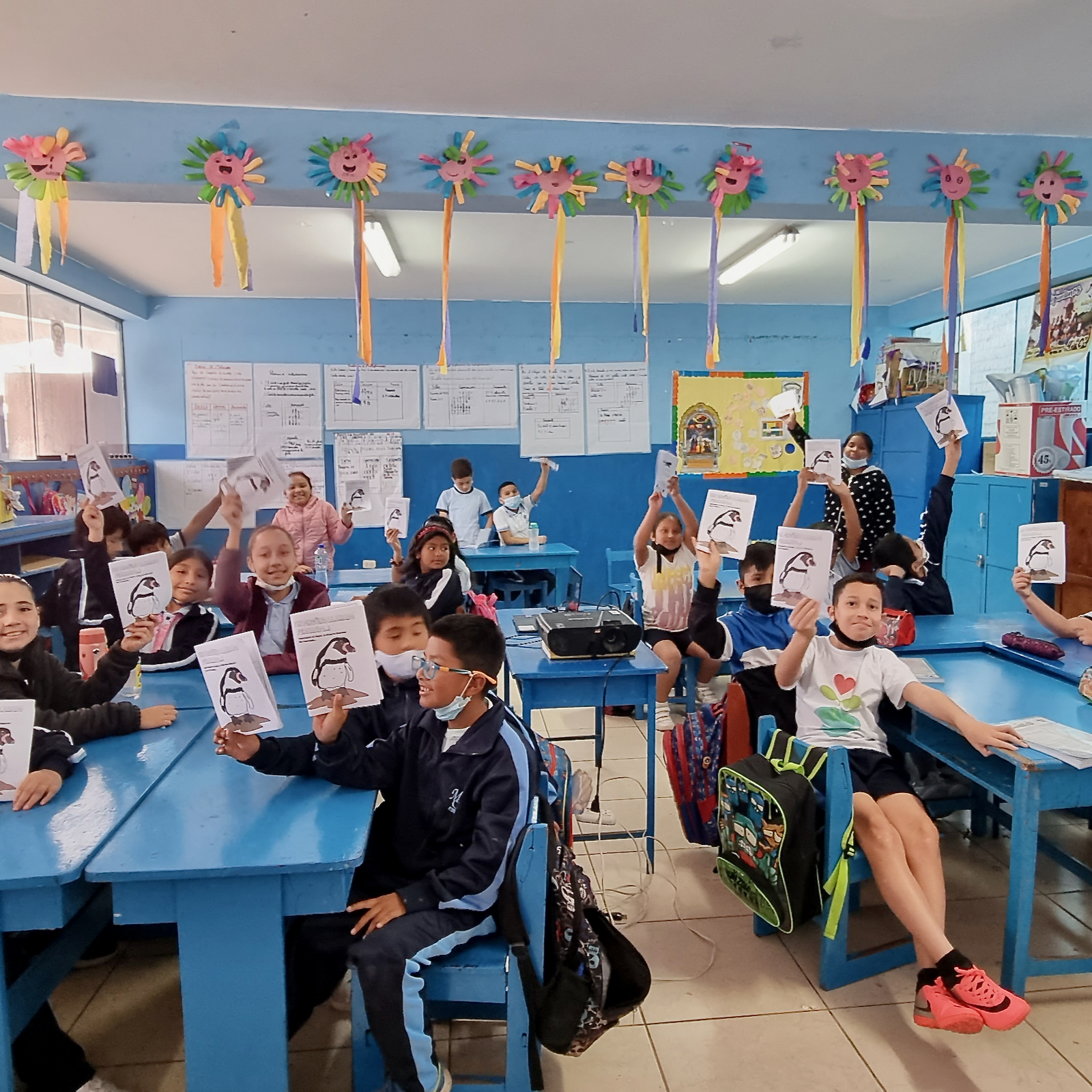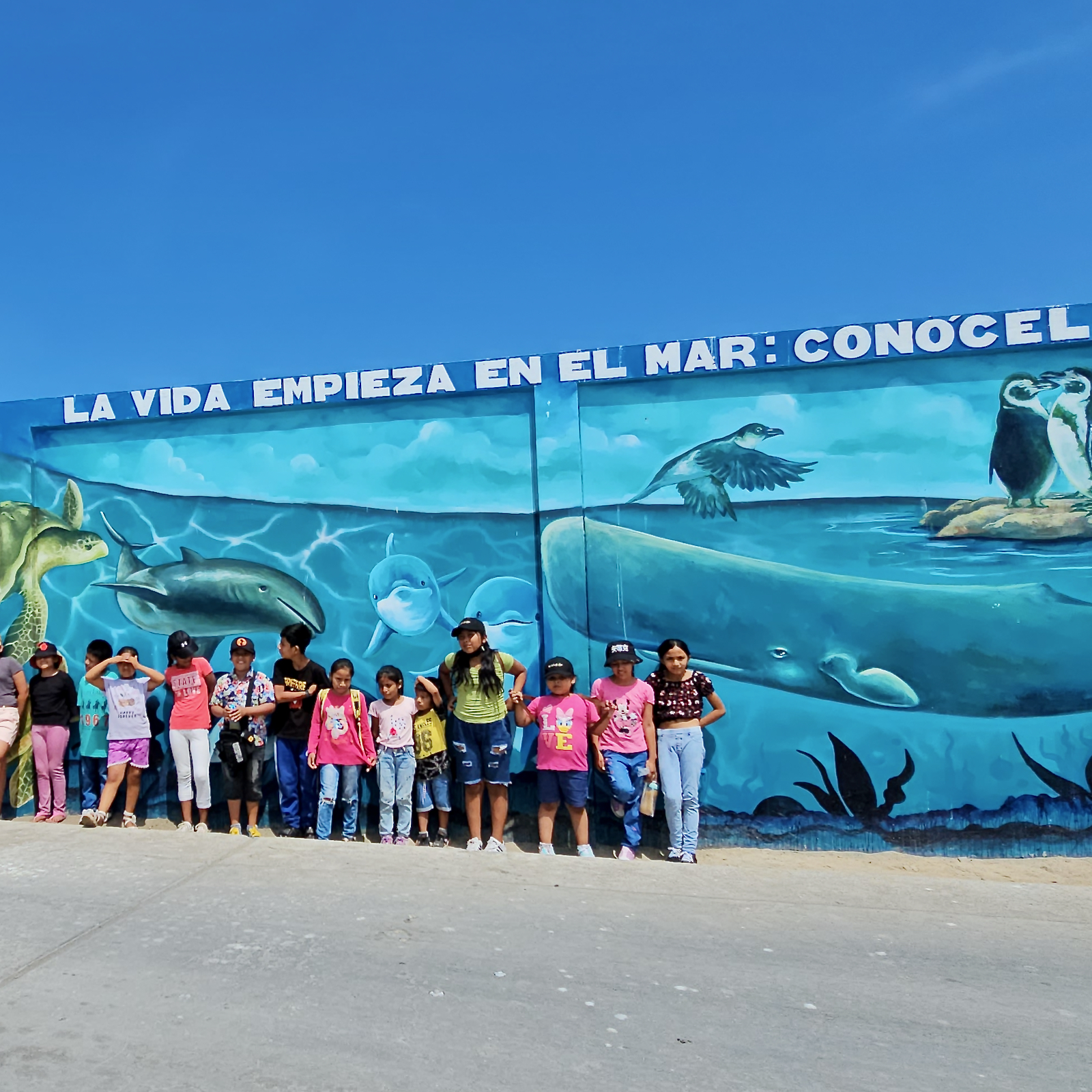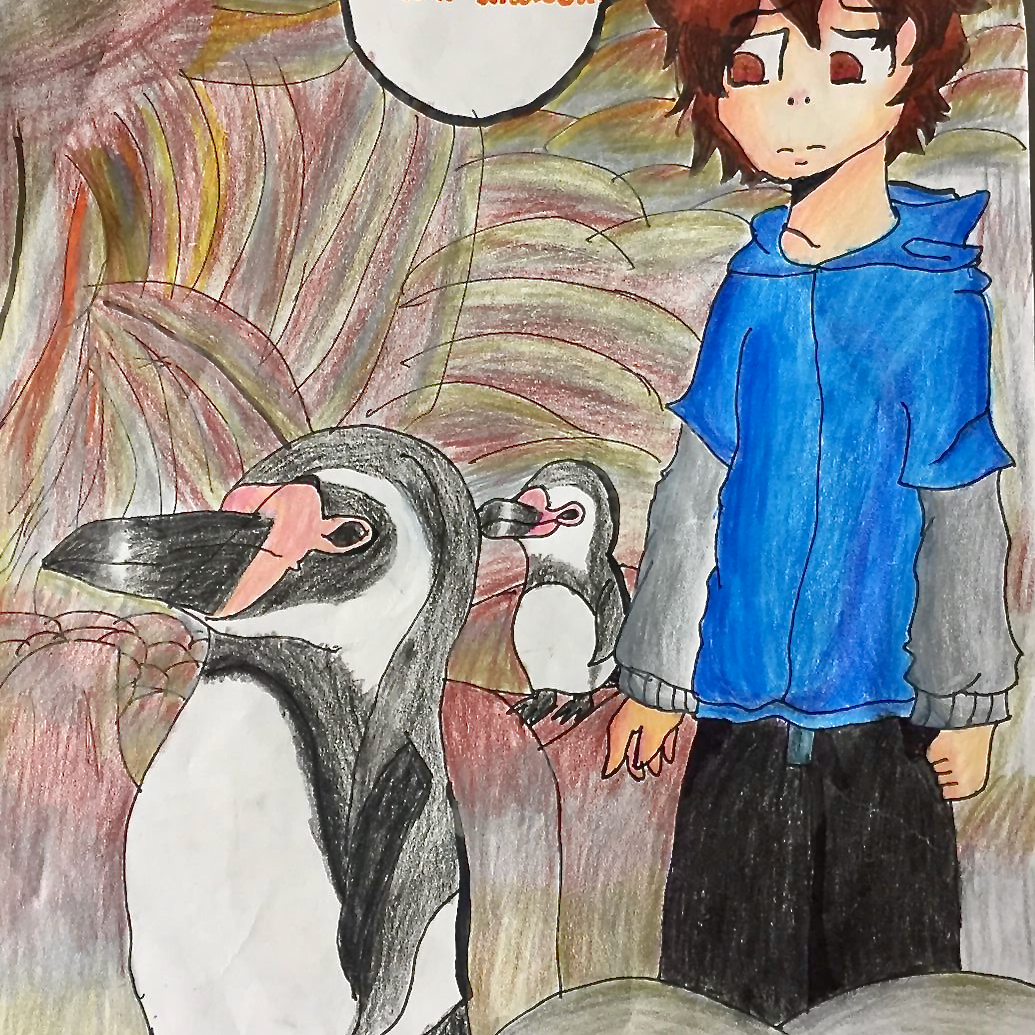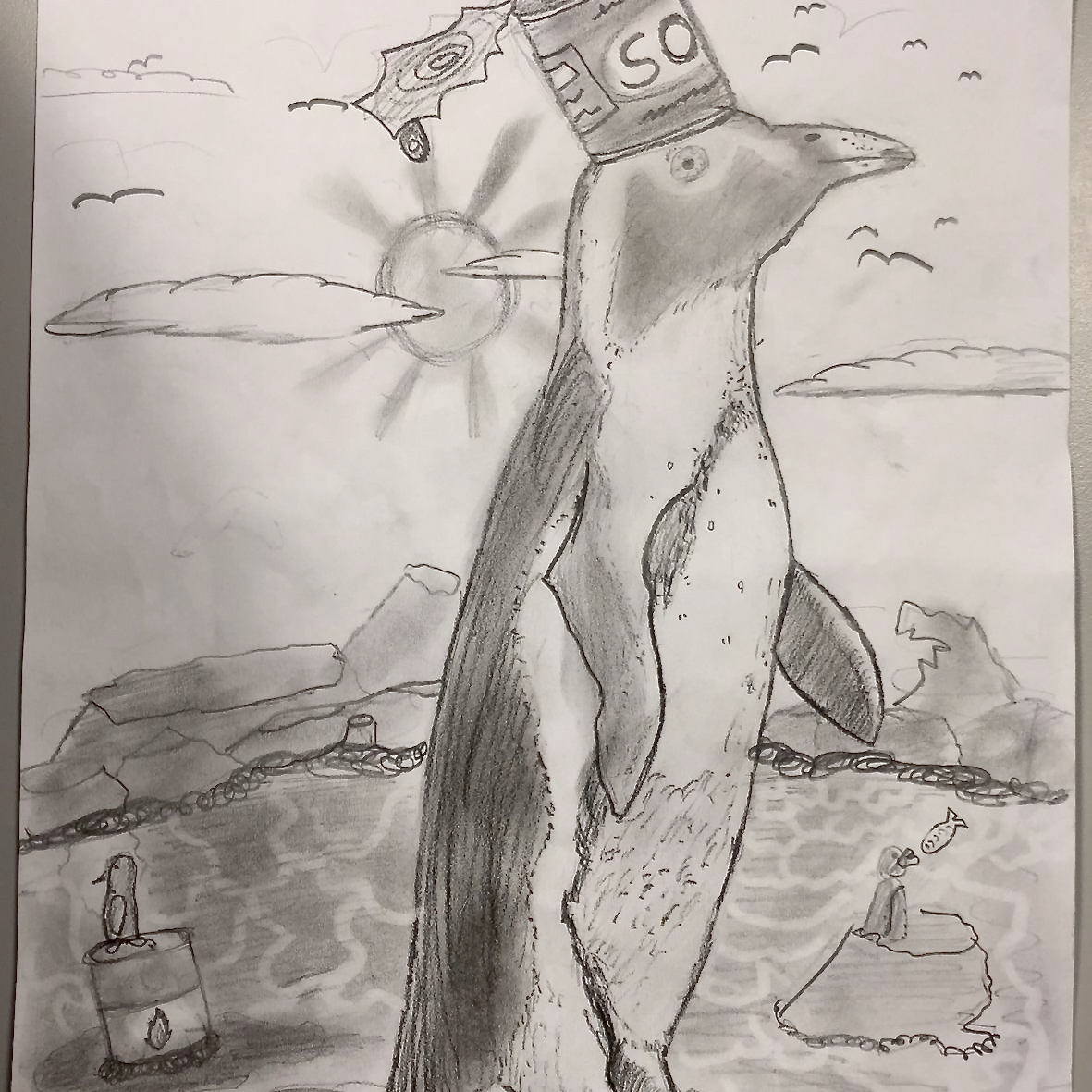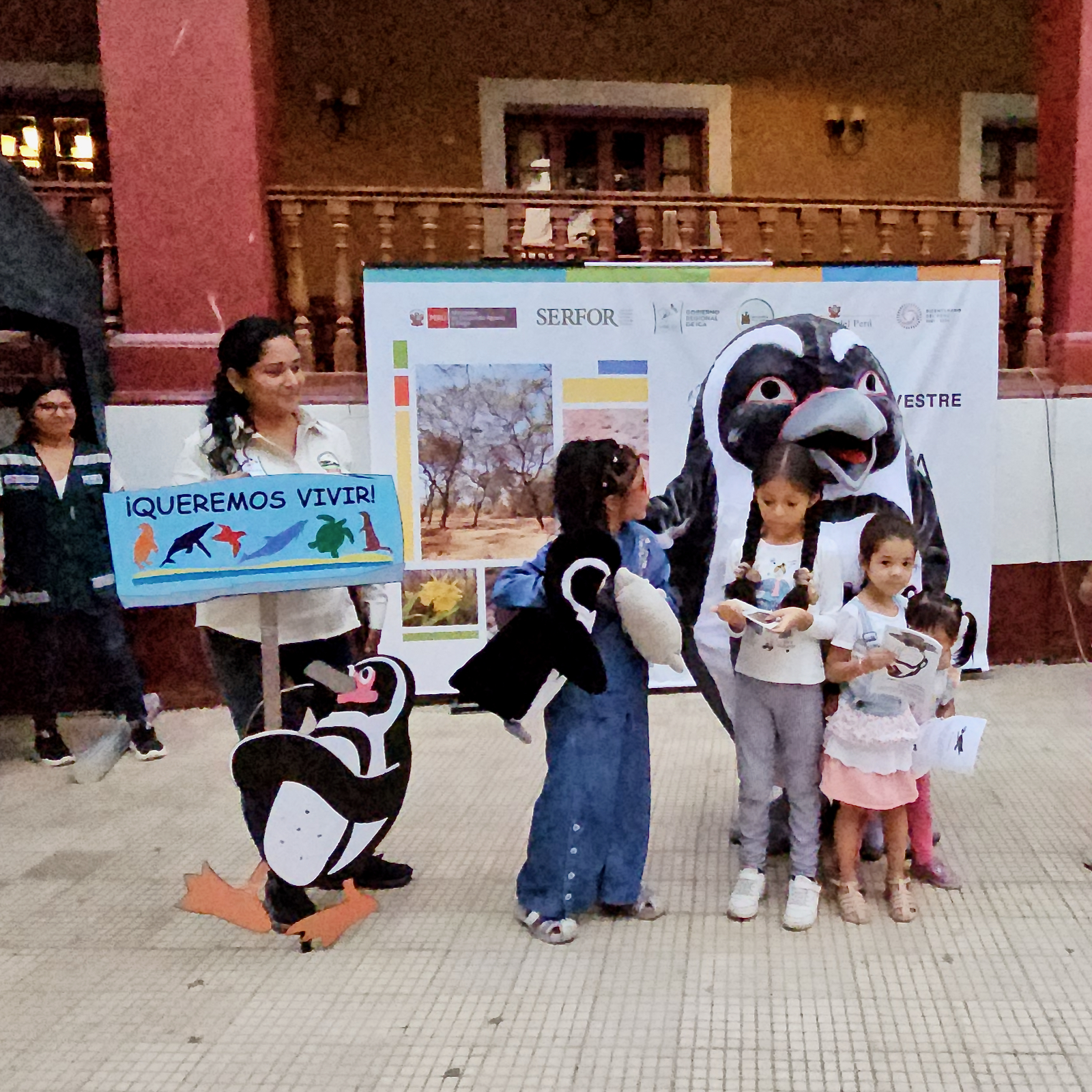Pisco, Peru, Landau May 30, 2023
In September last year, Acorema began the project named "Creating and Strengthening Swareness Spaces for the Conservation of the Humboldt Penguin on the Central Coast of Peru“. The environmental education program lasts until the end of August 2024. Because of weeks of unrest with curfews, the educaional work took place under especially difficult conditions. In May 2023, Señora Milagros Ormeño Benavidess of ACOREMA (Áreas Costeras y Recursos Marinos), Pisco, Peru, wrote the following report including photos and small videos for Sphenisco.
Summary of Activities for the Period September 2022 to May 2023.
1. Introduction
The Humboldt Penguin is a species endemic to the Humboldt Current (or Peruvian Current) region and restricted to a coastal zone of Peru and Chile, including islands, of approximately 4,700 km. Its breeding range goes from Foca Island (5º12'S) in Peru to Metalqui Island (42º11'S) in Chile (1) (Hiriart-Bertrand et al. 2010). This area corresponds almost exactly with the range of the Peruvian Anchoveta (Engraulis ringens) and the uplift ecosystem (1) (Jahncke et al. 2004).
In Peru, the most important breeding colonies are located on the central coast, primarily in Paracas National Park. The park is one of the most important nature reserves in the country and is also recognized as one of the most important bird sanctuaries (IBA) in the country (2).
It is our obligation to preserve this wealth. Unfortunately, in the last few decades the degradation of ecosystems, as well as the impact of other human activities, such as bycatch in fisheries and their use as pets, have threatened our biodiversity, of which the Humboldt penguin is one of the most important representatives. Moreover, the effects of natural phenomena add to this, such as "el Niño", which is forecast to occur in the coming years and which will come along with changes concerning various factors in the ocean that could affect the Humboldt penguin.
One aspect that should be highlighted is the relevance of this species to the scientific community. This was demonstrated by the Population and Habitat Vulnerability Assessment (PHVA) workshop for Humboldt penguins (3), which took place in Peru in 2019. The workshop brought together the main researchers and actors on this penguin species. Among others, one of the topics discussed in this workshop was the need to develop strategies to raise awareness among different target groups. Based on this, a series of recommendations were expressed to address the problem that "the general public receives little information about the current conservation situation and threats to the Humboldt penguin." Consequently, one of the aims, which were set to address this problem, is to create educational materials and tools to support conservation programs for the Humboldt penguin that are addressed to the general public.
For this reason, ACOREMA has developed awareness activities and spaces. They aim to use the active participation of local people to engage fishing communities in actions that support the conservation of the Humboldt penguin and its habitat. This is carried out with an awareness strategy to bring about a change in attitudes among children, youth and adults in order to overcome harmful behavior patterns, raise awareness, and acquire attitudes that contribute to the conservation of the Humboldt penguin.
In this regard, ACOREMA - with the support of SPHENISCO - initiated the program "Creating and Strengthening Awareness Spaces for the Conservation of the Humboldt Penguin on the Central Coast of Peru" including numerous activities aimed at increasing the involvement and empowerment of the local population in the conservation of the Humboldt Penguin and its habitat.
2. Objectives
2.1 General Objective
Strengthening the participation and empowerment of the local community in the conservation of the Humboldt penguin and its habitat.
2.2 Specific objectives
2.2.1 Creating new awareness spaces for the conservation of the Humboldt penguin and its habitat in areas with the main breeding colonies on the Peruvian coast.
2.2.2 Consolidating actions for the conservation of the Humboldt penguin and its habitat by different representatives in the Ica region and in coastal communities South of Lima.
3. Activities
3.1 Improving information about the Humboldt penguin and its habitat in communities with breeding areas of the Humboldt penguin.
One of the aspects that requires ongoing work is the propagation of information and awareness raising. In this regard, it is necessary to provide information material that generates impression, but at the same time is easy to understand. Therefore, ACOREMA has carried out:
3.1.1 Audiovisual workshops in schools
Audiovisual workshops in schools in Pisco, Pucusana, Ica, Chincha and Nazca were attended by about 1,700 primary and secondary school students from the schools Miguel Grau Seminario (Pucusana - Lima), José de la Torre Ugarte (Pisco), San Juan (Changuillo - Nazca), Miguel Grau (Chincha), Colegio de Alto Rendimiento - COAR (Ica). In these workshops it was dealt with endangered species in the ocean, focussing on the Humboldt penguin through an ecosystem approach.
3.1.2 Promotion of activities
As a result of the audiovisual workshops, the development of activities by students and teachers were promoted. Thus, they carried out various actions, such as the "Week of the life of animals", the "Humboldt Penguin Day" and others. Within this framework the students created stories, exhibitions, posters, and comics that were displayed in their schools and published online. Through these activities, 2,700 people were reached.
3.2 Skills Development of Student Groups in Ica
A series of activities have been planned with teachers from the University of San Luis Gonzaga in Ica. They will take place between July and December. These activities consist of training sessions on biodiversity and the importance of protected areas in the Ica region. In addition, there will also be joint actions for the propagation of information and how to actively participate in educational and awareness campaigns on the conservation of marine endangered species and their habitat.
3.3 Conducting workshops "Getting to know and protecting our Humboldt penguin and its habitat“
The summer workshops "Getting to know and protecting our Humboldt penguin and its habitat" were held with the active participation of the Department of Culture, the Department of Environment and the Communications Department of the District Municipality of Tambo de Mora. The municipality was also interested in contributing to the safety of children. In these workshops, different topics were dealt with, aiming to explain the sea with its species and its threats, and aiming to protect it.
3.4 Training for students of early childhood education at institutes and universities in the Ica region
There will be agreements with the management of the Juan XXIII Institute in Ica to carry out trainings for future kindergarten teachers*. In several training sessions the focus lies on skills in early childhood, which help to learn about and protect the ocean. During these trainings, different techniques are applied - performed by competent artists - such as making hand puppets and working with them.
3.5 Finalizing the book "The discovery of our ocean with the Humboldt penguin" for the primary level
Among the different applied strategies, there is also the creation of drawings, comics and other types of material by children and adolescents of the primary level. Their works will then be used to design the book "The discovery of our sea with the Humboldt penguin".
3.6 Creating awareness spaces for marine conservation
Activities were and more will be carried out with various representatives, officials and institutions to implement various measures for the conservation of the Humboldt penguin and its habitat as part of the initiative "Creating awareness spaces for marine conservation". For example, activities with the Technical Forestry and Wildlife Administration of Ica (ATFFS Ica), an office that is part of SERFOR, were developed. With this institution, which represents the National Forestry and Wildlife Administration in the country, the Day of the Wildlife was celebrated, with the participation of various local officials and institutions.
Likewise, an activity was carried out with the State School for the Highly Skilled of Ica for the "Day of the Penguin". Secondary school students participated in this activity and produced different materials relating to the Humboldt penguin.
There were also presentations on virtual platforms to show the activities that have been developed over the years concerning the Humboldt Penguin. One example of this is Red Educa Verde (4) with the "Second International Congress of Red Educa Verde - Peru Chapter", which was attended by more than 2,500 people who are interested in this type of initiative and wanted to learn more about it.
In collaboration with the community of Tambo de Mora and students from the schools Miguel Grau and Juan XXIII schools, during the second week of June, a mural will be painted at the port of Tambo de Mora.
In addition, for June 10 an event was planned together with the Ministry of the Environment (MINAN) to celebrate Environment Day and World Oceans Day.
by Milagros Ormeño B.
translated by Angelika Veelken
Annotations:
(1) Jahncke, J., Checkley, D., M. & Hunt, G. L. (2004). Trends in carbon flux of seabirds in the Peruvian upwelling system: effects of wind and fisheries on population regulation. Fish. Oceanogr. 13(3): 208-223.
(2) BirdLife International (2023) Important Bird Area factsheet: Reserva Nacional de Paracas. Downloaded from http://datazone.birdlife.org/site/factsheet/14911 on 25/05/2023.
(3) McGill, P., J. Reyes, A. Baker, R. Lacy, R. Paredes, J. Rodríguez, A. Tieber, R. Wallace, (Eds.) (2021). Pingüino de Humboldt (Spheniscus humboldti). Taller de Evaluación de Viabilidad de Población y Hábitat. Informe Final. UICN SSC Grupo de Especialistas en Planificación de la Conservación, Apple Valley, MN, USA
(4) „Netzwerk Grüne Bildung“, an independent network of educators from different countries who apply a holistic approach on their teachings




